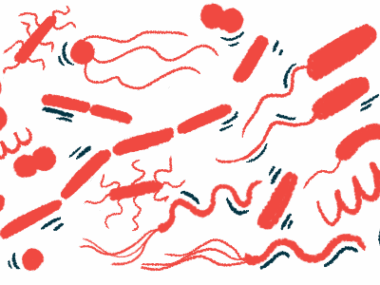Gut Bacteria From Acid Reflux May Promote CF Lung Inflammation
Written by |

Gut bacteria entering the lungs during acid reflux episodes may promote lung inflammation and poorer lung function in cystic fibrosis (CF) patients, a new study reports.
These findings may explain why people with CF and acid reflux tend to have poorer lung function.
The study, “Exposure to bile and gastric juice can impact the aerodigestive microbiome in people with cystic fibrosis,” was published in Scientific Reports.
Gastroesophageal reflux (acid reflux) occurs when acid from the stomach flows back into the esophagus, causing heartburn; it affects about 50% of people with CF. Acid reflux may occur because the stomach empties more slowly and due to lower pressure at the esophagus-stomach junction, among other reasons.
Past research has suggested that people with CF may experience movement of microbes from the gut to the lungs. In fact, Pseudomonas aeruginosa and non-tuberculosis mycobacterium (NTM), which are relevant in CF, have been described in the gastric juice (acid) and sputum of people with this disease. However, the understanding of how the gastrointestinal environment interacts with specific microbes obtained from CF patients is still limited.
A team of researchers studied 13 CF patients in the U.K. All provided gastric juice and sputum samples in two occasions, six months apart. Strains of P. aeruginosa and NTM bacteria were analyzed and their genetic sequence determined.
The patients were a median age of 25 and were all fed via a tube inserted into their stomachs. All were long-term antibiotic users and took acid suppressants. P. aeruginosa was identified in gastric juice samples from two patients and in two other patients six months later. In sputum samples. P. aeruginosa was isolated from nine patients at the first instance and from five after six months. P. aeruginosa was similar genetically in the gastric juice and sputum in two patients at the first timepoint (confirmed with gene sequencing) and in one six months later.
“Our present study builds on and strengthens our previous findings, using whole-genome sequencing to confirm that Pa [P. aeruginosa] found in both gut and lung were closely related,” the researchers wrote.
Notably, P. aeruginosa could not grow and survive in acidic gut-like environments in the presence of the stomach enzyme pepsin. “We demonstrated a significant bactericidal impact for Pa in acidic conditions … but a higher pH levels, the impact was small. When pepsin is present in acid conditions, Pa were more effectively destroyed,” they wrote.
NTM bacteria were isolated from five patients. Among the participants with sputum isolates, two had the same strain of NTM confrmed by genetic analysis in their gastric juice.
The research team found variability among P. aeruginosa strains in their response to environments, replicating the stomach with a high bile acid content or the lung with a lower bile content.
“At concentrations similar to those in the stomach, bile acids had a potential negative impact on Pa growth, with a tendency to form a biofilm [slimy layers of microorganisms that stick to wet surfaces and other bacteria]. Interestingly, there was variability between strains,” the scientists wrote. “The behaviour of Pa was different when challenged with lower concentrations of bile acids, analogous to lung levels. Pa growth was unchanged, but a rise in biofilm formation was observed.”
“This could be a contributory factor to the decrease in lung function and morbidity observed in CF respiratory disease,” they added.
“We postulate that our findings may be particularly important if bacteria enter the lungs as a direct inoculum following gastric reflux and aspiration. It is possible that Pa in the stomach, converted to biofilm by the effect of high bile acid levels, is refluxed into the airways, where bile acids represent an ongoing environmental pressure to drive and maintain Pa biofilms,” the research team wrote.
The researchers noted some limitations to the study, including the small sample size. They said further studies should investigate how reflux leads to chronic inflammation and infections in CF.







